Next step
Need Clarity & a way forward?Do you have:
- A completed manuscript
- A journal decision letter
Fill out the form to get totally free advice on:
- What to fix, what to ignore
- What your editor wants
- If your paper is publishable
What happens next?
- I’ll review your info and explain how I can help.
- If applicable, I’ll help unblock publication—at no cost
- I’m currently offering a limited number of cases- free.
Open the Form
Rest assured, your privacy is fully protected and your information will never be shared.
Want a 100% free course to boost your academic skills?
Want to finally get your paper published?
With a targeted revision strategy you will refine the problematic parts of your paper, minimise resubmissions, and move forward toward publication.
Delaying your paper publication can stall your career. If you’re stuck—whether with feedback, revisions, writing clarity, or style—a strategic revision plan will change how you think about progress.
Check out the FORM if you’re looking to avoid high-risk revision mistakes while you retain ownership of the writing.
Watch how to start your research the right way
How it works:
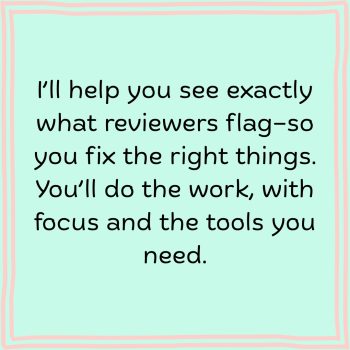
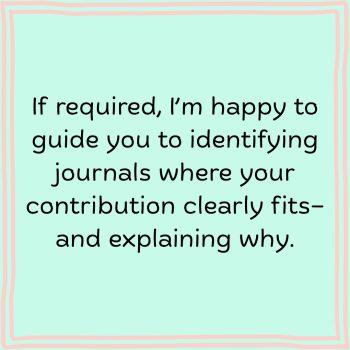
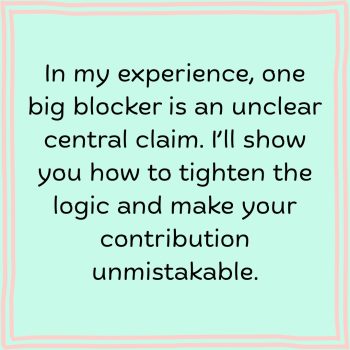
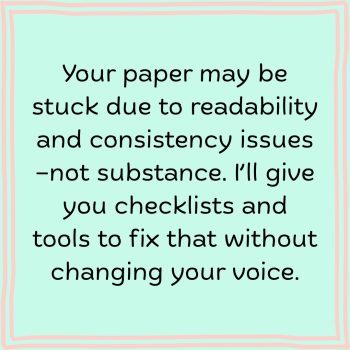
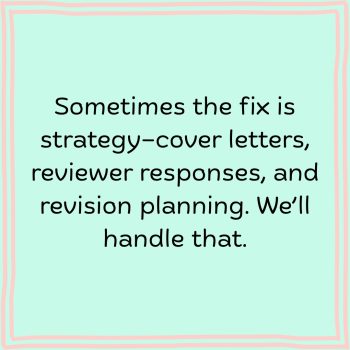
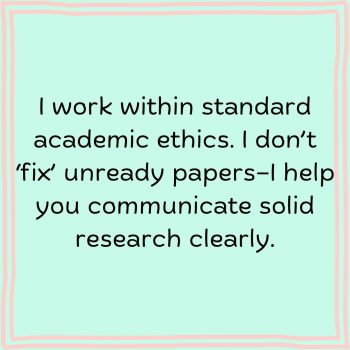
I have a few available timeslots if you wish to request a (video) call. Please note that a call can be confirmed only if you have already submitted the form above.
About me
Through decades of work and study in academic and research writing—including completing both a dissertation and a thesis focused on academic writing—I have developed a strong foundation in how research and language choices can critically determine the success or failure of a text, particularly in academic contexts.
This foundation, supported by extensive and progressively senior experience working with educators, research writers, and subject tutors, has sharpened my understanding of the key requirements and recurring shortcomings that often make or break academic writing. As a result, I have developed a keen eye for both detail and the bigger picture—where texts lose clarity, purpose, or impact, and why they fail to meet their aims.
While I have my own experience of publishing, it is my work as a reviewer and my sustained practice in advising and supporting writers that most strongly underpins my effectiveness in advising and coaching on specific aspects of research writing.
These aspects include continuity and connection between parts of the research, logical flow, and rigorous evaluation. Achieving them requires a deep understanding of language choices and structural decisions, which allow each piece of a paper to click seamlessly into place.
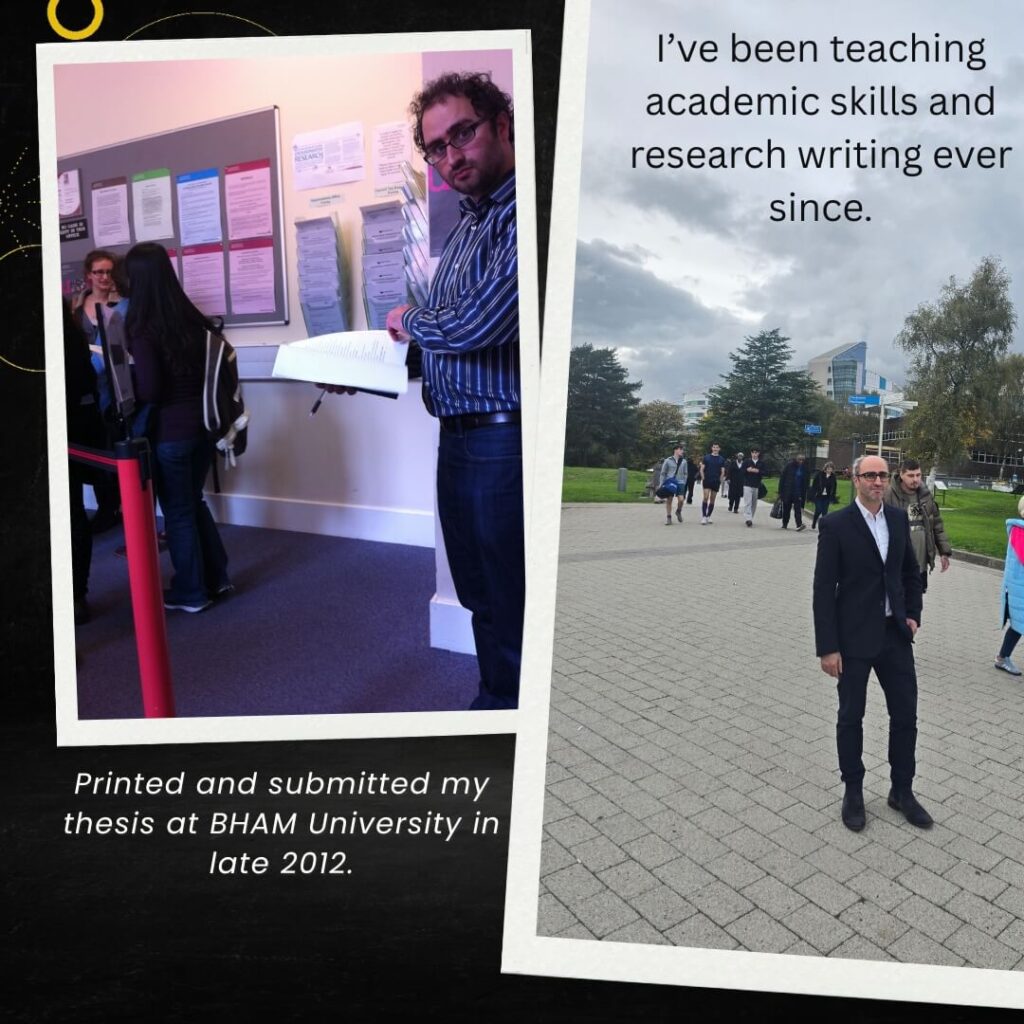
Of course, every journal has its own criteria, expectations, and underlying logic. Tailoring a paper to meet those standards is as important as the research itself. Yet one principle remains constant: clarity and cohesion. Clear communication — not only in individual sentences but across the structure, argumentation, and reasoning of a paper — ensures that the research journey, its contribution, and its insights are fully visible and appreciated.
My journey through undergraduate, postgraduate, and doctoral research, and later through teaching and coaching students and research writers, taught me how writing functions beneath the surface. That foundation has allowed me to effectively coach writers to engage confidently with feedback, refine their work, and navigate the complex world of academic writing — turning initial setbacks into learning opportunities and eventual success.
As an EAP instructor and writing coach, I’ve spent years helping students and colleagues diagnose and fix the hidden issues that weaken their writing. I’ve reviewed papers, advised peers, and supported countless learners as they turned uncertainty into confidence.
Drawing on these experiences, I developed a carefully structured paper-review process that integrates self-assessment, guided reflection, deliberate practice, insightful feedback, and personalised tutoring. Through few targeted checks, this process identifies and fixes the issues that often prevent papers from being published—in the span of 4–5 weeks.
More importantly, it develops you as a writer, equipping you with a clear understanding of what matters and how to achieve more publication in the future.

— Sara, PhD candidate, Life Sciences.


The Writing Bridge
Are you an early-career researcher, postdoc, or professional ready to turn your research into a published paper — but struggle with academic writing, structuring, or feedback?
Publishing is crucial for career advancement and job security, yet slow progress or repeated rejections can hold you back while others move ahead. It’s time to sharpen your writing skills, gain clarity on the publication process, and finally get your work accepted.
The Writing Coaching Programme takes you on a journey of discovery where you reflect on your own writing, gain fresh perspectives from peers, and receive personalised one-to-one guidance that helps fast-track your paper review process and bring your manuscript closer to publication.
My 4-step clarity model
Unlike generic online courses, The Writing Bridge offers a flexible, carefully designed curriculum tailored specifically to your writing needs and goals.
Below is a glimpse of some of the key “ingredients”—but the real magic lies in how these elements work together to deliver the results you want. (You’ll need to watch the webinar to see how it all comes together.)
Weekly workshops to build skills and momentum
Guided self-assessment and reflection to help you become a more independent, confident academic writer
Peer feedback focused on your writing—not generic templates or vague advice
One-to-one tutorials for truly personalized support
All of this combines to give you motivation, structure, and accountability, keeping you on track and moving forward.
Each of these steps acts as a filter or layer that helps you revise and refine your paper until only the strongest version remains. Along the way, you identify and remove the bottleneck that keeps you stuck in the reviewer feedback loop.
By the end of the programme, you’ll have gained new insights into your writing habits and what makes writing effective and clear—insights that will set you up to publish one paper after another.

What you’ll gain
Clarity and structure to overcome procrastination and overwhelm
Transferable academic skills for publishing and refined research writing
Confidence to get your paper accepted and progress your career
Ongoing support beyond the programme while you finalise your work

What You will cover
Through hands-on workshops (e.g. structure and coherence), regular submissions, checkpoints, and personalised tutorials, you’ll master the skills to:
-Clarify the story behind your data
– Organise your ideas into a clear, compelling structure
-Navigate the review process with confidence and strategy
-Overcome perfectionism, self-doubt, and confusion that can stall publication
-Frame your work for the right journals and audiences

The curriculum, support, and materials provided here are independent and not affiliated with any university, educational institution, or other organisation. References to external resources or institutions, when necessary, are for educational purposes only and do not imply endorsement or partnership.
